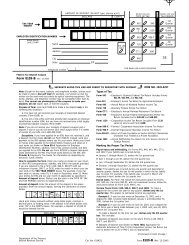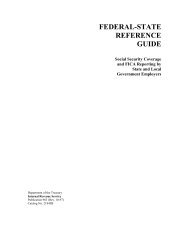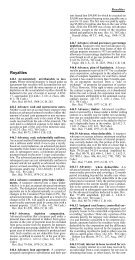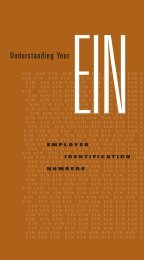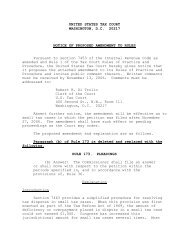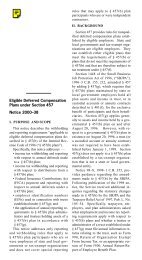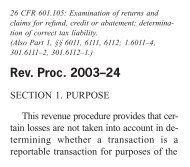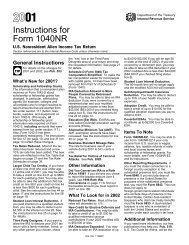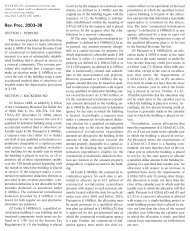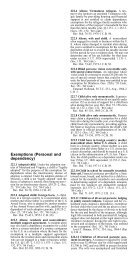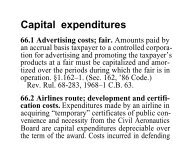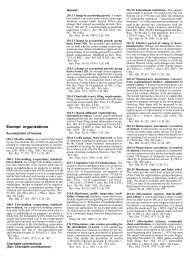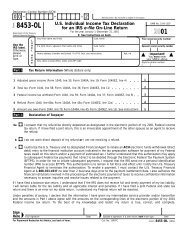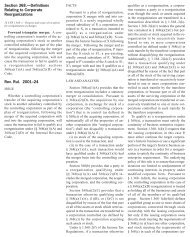Auto Dealerships - Audit Technique Guide - Uncle Fed's Tax*Board
Auto Dealerships - Audit Technique Guide - Uncle Fed's Tax*Board
Auto Dealerships - Audit Technique Guide - Uncle Fed's Tax*Board
Create successful ePaper yourself
Turn your PDF publications into a flip-book with our unique Google optimized e-Paper software.
In Rev. Proc. 97-44, I.R.B. 1997-41, (September 25, 1997), the IRS provided relief for<br />
franchised automobile dealers that have violated the LIFO conformity requirement. This<br />
revenue procedure provides relief for automobile dealers that elected the last-in, first-out<br />
(LIFO) inventory method and violated the LIFO conformity requirement of section 472(c) or<br />
(e)(2)of the Internal Revenue Code by providing, for credit purposes, an income statement<br />
prepared in a format required by the franchisor or on a pre-printed form supplied by the<br />
franchisor (an automobile manufacturer), covering any taxable year ended on or before<br />
October 14, 1997, that fails to reflect the LIFO inventory method. See, e.g., Rev. Rul. 97-42,<br />
1997-41 I.R.B. (Situation 3). <strong>Auto</strong>mobile dealers that comply with this revenue procedure<br />
will not be required to change from the LIFO inventory method to another inventory method<br />
as a result of such LIFO conformity violation.<br />
Revenue agents should at a minimum, inquire if the taxpayer elected the above relief. If the<br />
taxpayer did elect the above relief, were the required three payments made.<br />
If the taxpayer did not elect the relief, the agent must check to see if the taxpayer is in<br />
violation of the LIFO conformity requirements under IRC section 472.<br />
Even if they did elect the relief, taxpayers are required to continue to comply with the<br />
requirements of the regulations.<br />
Rev. Proc. 98-46 extended the relief in Rev. Proc. 97-44 to medium and heavy truck dealers.<br />
3. What are the record keeping requirements?<br />
A taxpayer electing LIFO agrees to maintain adequate records to comply with the regulations.<br />
Treas. Reg. section 1.472-2(h) requires a taxpayer electing LIFO to maintain records<br />
supporting the LIFO computations and compliance with the LIFO regulations. Treas. Reg.<br />
section 1.472-2(h) places a substantial responsibility on the taxpayer since, under the LIFO<br />
reverse order principle, the costs in ending inventories relate to years all the way back to the<br />
year of the initial LIFO election. A taxpayer may have the LIFO election terminated for non<br />
compliance. See H.E. Boecking, Jr. and Sally Boecking v. Commissioner, T.C. Memo.<br />
1993-497, CCH 49,362(M). See Treas. Reg. section 1.472-8(e)(1).<br />
4. How do write downs affect the LIFO election?<br />
LIFO is a cost method. Write downs from cost are not permitted. A taxpayer as part of the<br />
election must restore to the base year inventories all cost write downs to items on hand. This<br />
means restoration must be made to the beginning inventory in the first year covered by the<br />
LIFO election.<br />
The write downs that must be restored (and that cannot be subsequently claimed as long as<br />
the LIFO election is in effect) include "lower of cost or market" write downs, Treas. Reg.<br />
section 1.471-4, as well as "subnormal goods" write downs. See Treas. Reg. section 1.471-2,<br />
Rev. Rul. 76-282, and Rev. Proc. 76-28, 1976-2 C.B. 645.<br />
8-18



